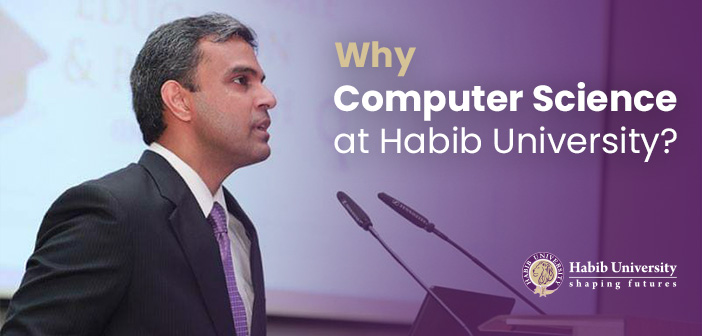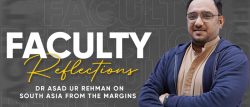A detailed outline by Dr. Waqar Saleem
Disclaimer:
I am a founding faculty member of the BS Computer Science Program at Habib University (CS@HU). I have been with the program since 2012, two years before we opened our doors to students. I have been lucky to work with gifted colleagues on the program which has grown from the smallest on campus with an inaugural class of less than 20 students in 2014 to the largest where the university receives a staggering excess of applications to the program and inducts close to 100 students at the time of this writing in early July 2020.
Colleagues at Habib University in Karachi have called me the architect of CS@HU. Below, I explain the program for the benefit of various stakeholders and to assemble answers to some questions that I am commonly asked. Some of these are:
- Should I/my child pursue CS at CS@HU or at University X in Pakistan?
- Tell me about the program.
- How is CS@HU different from University X?
These are all valid queries and I am grateful for the interest in CS@HU. I refrain from answering questions like, “Is CS@HU better than CS at University X?” All programs at all universities are doing their best. Below, I provide information about CS@HU so that you may make an informed decision that best suits you.
At HU
CS@HU has to be understood in the context of Habib University (HU). HU is a liberal arts university. All majors including CS are firmly grounded in HU’s Liberal Core which is a set of 11 courses spanning 7 forms of thought that cover areas like philosophy, literature, history, religion, and formal reasoning. The core signifies essential knowledge and sensibilities that HU believes a functioning citizen in this day and age, regardless of her major, should have. Each major is then in addition to the Core. This is what makes HU the best university for computer science in Pakistan.
HU believes that the most important skills in the foreseeable future are the ability to learn and unlearn, to think critically, to be effective at communication, and to work in interdisciplinary teams. As Deborah Fitzgerald said in our Yohsin lecture, “The world’s problems are no longer technical only.” We believe that technical knowledge devoid of context is not only meaningless but dangerous. The undergraduate phase of one’s education is therefore not meant to specialize but to build a broad and strong base. And HU works hard to provide its students with diverse exposure. Market surveys and studies back this stance and studies have shown that liberal arts graduates are more successful mid-career than those from specialized backgrounds.
This stance has won HU kinship at US institutions which have opened their doors to us in terms of student and faculty exchanges. Many students are already aware of HU’s summer abroad programs with Stanford, Berkeley, Michigan, and Texas A&M. I have had exchange semesters as a faculty member at Texas A&M University and at Pitzer College. HU’s Board of Governors is similarly populated with experienced educators from US institutions who fly (except during COVID when they participated remotely) to Pakistan multiple times a year to participate in our board meetings and other notable events. We realize we are young and constantly reach out to other similar institutions for guidance and collaboration in terms of syllabus design and processes.
HU believes in excellence which is one of its 5 Yohsin values. This is reflected in our campus, our services, our processes, our student intake, and our faculty. Our chancellor has promised on record that if you qualify for admission academically, money will not be an issue. When we realized that Inter students were disadvantaged compared to A Level students, we started the TOPS program which identifies top Inter students in the city and provides them free coaching to participate in the same admission process as everyone else. TOPS students who qualify are given a 100% scholarship for all 4 years provided they maintain a certain academic standard. These constitute 25% of the student intake each year and are independent of and in addition to the scholarships, fellowships, student loans, and financial aid given to other students. Close to 90% of the student intake every year is on some form of financial support.
CS@HU
CS@HU views CS as an intellectual pursuit, grounded in mathematics and logic. That it happens to have practical applications is a pleasant side effect but computer science is primarily a rewarding exercise of the mind, akin to philosophy. As such, the program is not for everyone, and students expecting their undergraduate education to make them specialists in any given branch of CS tend to find faults. Having said that, our students have been successful at finding various opportunities and generally leave a good impression. Employers tend to hire more of our graduates once one joins. In these COVID times, many students have secured full-time employment before graduation. We see this as a validation of our approach.
An Intellectual Playground
CS@HU embodies the liberal spirit of intellectual exploration. The celebrated physicist, Richard Feynman, says, “You cannot develop a personality with physics alone; the rest of your life must be worked in.” Our CS curriculum has provided our students the space to complement their CS major with not only courses but in many instances a full minor in diverse areas such as Philosophy, Maths, Physics, Literature, and Communication and Design. Only about half of the required courses required for the CS major are from CS. This spirit reflects that when our students choose their summer courses for HU’s university study abroad programs (for which they regularly get selected) their default approach is to explore novel topics instead of taking more CS courses.
Academic Rigor
CS@HU is posed with an interesting challenge. How do we ensure a top-notch, globally competitive experience for our students when the field has come to be defined by constant change and we have comparatively smaller space in our student’s curriculum? We do not have a choice but to do a great job in our CS courses. We focus on the fundamentals of computer science: math, logic, data structures, and algorithms. Our curriculum actively counters the myth that BS computer science in Pakistan is equivalent to coding. It is no coincidence that our students find the program theoretical. This approach has been validated to us by various employers and global hiring practices.
The international linkages of HU are well known and CS@HU has leveraged them for the benefit of our students. Our first curriculum in 2014 drew inspiration from those at Carnegie Mellon University and Texas A&M University, and representatives from each university participated in our curriculum workshop that year. In addition to our internal review of the curriculum every year, we periodically invite CS educators from like-minded partner institutions to critique our curriculum and provide feedback. The last one in 2017 led to deep changes in the curriculum.
We satisfy HEC’s accreditation criteria.
Connection
Education is a means to better understand and connect with society. Every CS@HU student performs a Khidmat for which she actively imagines applications of her classroom knowledge in the service of society and teams up with a non-profit cause to implement them. Our students have served at community schools and NGOs to conduct classes, develop infrastructure, and provide other support.
Another avenue of exposure to market practices is through our dedicated Office of Career Services. Our students are typically enterprising and tend to find opportunities on their own but the Office of Career Services is always there to provide support.
Community
At Habib University, you are part of a vibrant and empowered student culture. The year’s calendar is replete with events organized by student clubs which are under the aegis of the HU Student Government which is run completely by students and is consulted by the university administration for decisions related to students. We have more female students on campus than male and they are bold and outspoken. Gender issues are very much at the fore and some of our students are among the founders of Aurat March.
CS faculty have initiated Women in Computer Science and Engineering (WiCSE) to promote and support female students in our technical majors including CS. Female students at CS@HU find a thriving support culture and other female peers to work with. The fraction of female students in CS@HU is higher than a third and many of them outshine their male colleagues, who in turn learn to work alongside their female colleagues in a respectful manner and to appreciate them as bright young individuals.
The Center is You
The most important piece of the puzzle in Habib University’s pursuit of excellence is excellent students. We have an elaborate process to identify and admit the best students. We celebrate our students, their diversity, their talents, and their achievements. At Habib you have an excellent peer group and all of our services and facilities have one sole focus: you. This is reflected in the design of the campus spaces, the provision of wellness facilities, mental health counselors, medical services, modern online services, well-equipped labs, and various offices dedicated to ensuring your well-being and success from different perspectives. These include dedicated offices for Student Life, Academic Performance, Career Services, Global Engagement, Teaching and Learning, and Undergraduate Education. Faculty regularly undergo pedagogical workshops, on campus, abroad, and through invited trainers, so that they can deliver you the best educational experience. You have the chance to spend your summer at some of the best universities completely free of cost. Returning students often tell us that they felt little difference when there.
Software and Hardware
Another stereotype that CS@HU students break is that CS students are good with software while engineers are good with hardware. With our new minor in Electrical and Computer Engineering, CS students can now take specified courses from our Electrical and Computer Engineering program to gain the necessary skills in computer hardware, leading to a more well-rounded CS education and opening the door to exciting areas like Robotics, Smart Grids, and Internet of Things.
So, What To Do?
CS@HU is not for everyone. Our students are dreamers and explorers. They are not afraid to dabble in different paths before settling down. They relish multiplicity and they question the basics. In our short history so far, our students after getting the best undergraduate degrees from HU have founded environmentally minded startups; joined prestigious graduate programs, some diverging from CS; been founding members of design labs; been incubated at local incubators; worked at gaming companies; helped startups get off their feet; become product managers; while also succeeding in the traditional route of software development in areas like artificial intelligence and data science.
If you know you want to do CS and spending half of your undergraduate education studying philosophy, literature, history, and humanities sounds like a waste of time, then we are not the right program for you. If you want to emerge from your undergraduate education as an expert in some sub-area, e.g. Computer Vision, with several related courses under your belt, then we are not the right fit. If the prospect of reading Plato and Ghalib turns you off, there are much better programs for you. If you have your path all figured out already, other places will be more effective in getting you to your destination.
We are a good fit if you want to view your education as a journey of personal and intellectual growth and are open to the transformation that this will affect you. Critical inquiry begins with oneself. If you are willing to explore and challenge your own beliefs and assumptions, if you want to write a program in a new programming language, investigate different perspectives on colonialism, and train on a musical instrument all in the same day, you fit right in. If you thrive on diversity and appreciate differences of opinion, we are in the right place. If you want to be part of an intellectually piqued peer group, you will be right at home. And if you want to build an appreciation of computer science from its very raw fundaments, we cannot wait to welcome you!
Is CS@HU Good For Me?
The burden of decision is one that I cannot honestly relieve you of! Your path is yours to chart. I can provide information and trust that you will choose what is best for you. Whether that choice brings you to CS@HU or takes you elsewhere, we are united in our love of Computer Science and I wish you the very best in all the wonderful things you will do along your unique intellectual journey.
Habib University Admissions 2024 in Karachi is open. Apply Now!




